

3RD TERM SS2 CIVIC EDUCATION SCHEME OF WORK AND NOTE
Share this:
THIRD TERM E-LEARNING NOTE
SUBJECT: CIVIC EDUCATION CLASS: SS 2
1 Responsible Parenthood.
2 Factors that can lead to theSuccess of Responsible Parenthood.
3 Traffic Regulations.
- 2ND TERM SS2 CIVIC EDUCATION SCHEME OF WORK AND NOTE
- 1ST TERM SS2 CIVIC EDUCATION SCHEME OF WORK AND NOTE
4 Ways of Reducing Accidents.
5 The Roles of Individuals and Government in Maintaining Traffic Regulations
6 Interpersonal Relationship.
7 Inter-communal Relationship.
8 Settlement of Disputes in Inter-communal Societies.
1. Fundamentals of Civic Education for Senior Secondary Schools, Book 2, Sola Akinyemi.
2. Civic Education for Senior Secondary Book 2, R.W. Okunloye et.al.
RESPONSIBLE PARENTHOOD
Responsible parenthood is the ability of parents to provide for the overall needs of their children in order to become responsible citizens in the society. It involves the ability of parents to take care of their children and see to their financial, educational, social, emotional and material needs. It also refers to the duties of parents towards their children in order to prepare them for responsible adulthood.
The duties of parents start immediately the child is conceived. Both husband and wife ensure that there is adequate care for the baby and so the wife must attend antenatal clinic regularly and takes adequate nutrition for the total development and wellbeing of the baby.
After the child is born, both parents monitor the child from cradle to adult stage, monitor the type of friends he or she keeps and also guides the children in the way of God.
ROLES/RESPONSIBILITIES OF THE FATHER
1. He provides for the financial needs of his family.
2. He provide for the nutritional needs of the family.
3. He provides security for his family.
4. He provides shelter for the family.
5. He pays adequate attention to his children’s education.
6. He disciplines the family members when any of them is at fault.
7. He ensures that the children imbibe good values.
6. He shows his family love and care.
ROLES/RESPONSIBILITIES OF THE MOTHER
1. She prepares food for the family.
2. She keeps the house and surroundings clean.
3. She ensures the children are well fed.
4. She wakes up early to prepare the children for school and also get their food ready.
5. She supervises the children’s homework and also finds time to visit the children at school to ascertain their performance and behavior.
6. She supports her husband financially when necessary.
7. She monitors the health of the children.
8. She teaches her children to be obedient and respectful to family members and neighbours.
9. She must also show exemplary qualities in areas of character, relationship with neighbours and high moral values and also discipline and correct the children when they go wrong.
IMPORTANCE OF RESPONSIBLE PARENTHOOD
1. It produce s responsible children who would build up the nation.
2. It promotes good character and good values system in the society.
3. It brings aboutpeace and harmony in the society.
4. It reduces the rate of crime in the society.
5. It gives the children a sense of belonging and encourages them to contribute to the development of their country.
6. It reduces the level of illiteracy in the society.
7. It helps to reduce conflict in the society.
8. It produce s future leaders with spirit of nationalism and patriotism.
9. It enhances unity in the society.
10. It ensures responsible families in the society.
1. Explain responsible parenthood
2. Mention five importance of responsible parenthood in the society.
GENERAL EVALUATION
1. What is rule of law?
2. Explain three principles of rule of law.
3. In what five ways can leaders emerge in a state?
4. Outline any five roles of judiciary in a modern state.
5. List five importance of citizenship education.
READING ASSIGNMENT
Responsible Parenthood : Civic Education for Senior Secondary Book 2, R.W. Okunloye et.al, Pages 44-47.
WEEKEND ASSIGNMENT
Instruction : From the options lettered A-D, choose the letter that is most appropriate for the following questions. Answer all the questions.
1. The ability of parents to provide for the needs of their families is termed A. Responsible father
B. responsible parenthood C. grandparents D. Providing parents
2. The duties of parents towards their children start from A. conception B. birth C. adulthood D. adolescent
3. It is the primary duty of the father to A. provide for the family B. Cook for the children C. take children for excursion D. prepare the children for school
4. Whose duty is it to pay the children’s school fees? A. parents B. aunts C. uncle D. nephew
5. One of the roles of the mother is A. prepare the children for school B. pay children’s school fees C. pay for house rent D. Show leadership
1. List any six responsibilities of the children to their parents.
2. List five consequences of irresponsible parenthood to the society.
FACTORS THAT CAN LEAD TO SUCCESS OF RESPONSIBLE PARENTHOOD
The following factor s are required to bring about responsible parenthood.
1. Effective Education : Good education is one factor that can lead to successful responsible parenthood. Education gives the necessary exposure and knowledge that will help the parents to attend to the needs of their children.
2. Good Values System : The exhibition of positive values in the society will promote responsible parenthood in the country. Positive values teach us to be respectful, honest, responsible and patriotic.
3. Employment Opportunity : Engagement in economic activities will enable parents to provide for the basic needs of their children. Parents without jobs or good jobs may not be able to lead responsible family.
4. Family Size : The size of the family is determined by the number of people living together as a family. Small size family will promote responsible parenthood than a larger family. It is advisable that family size should not be larger than the income of the family.
5. Enlightenment Campaign : Public enlightenment campaign on the importance of responsible parenthood will go a long way to influence parents in response to the needs of their children.
6. Good Governance : A responsive and responsible government will provide the necessary infrastructures that will enable parents to be responsible.
7. Respect for Law and Order : People tend to be more responsible in a society where there is respect for law and order.
CONSTRAINTS OF GOOD PARENTHOOD
1. Poverty : One of the major constraints of good parenthood is the inability of the parents to provide for the basic needs of the family i.e. food, clothing and shelter. A situation where parents cannot fend for themselves it will become difficult to attend to the needs of the children either educationally, socially, materially, financially and otherwise.
2. Illiteracy : Illiterate parents lack basic knowledge and exposure that ensures responsible and good parenthood. The children are at the mercy of their peers and neighbours for survival. This is a major constraint of good and responsible parenthood.
3. Customs and Traditions : Some of our traditional practices and cultural beliefs are restrictions of good parenthood. In some cultures sending a girl child to school is a waste of time and resources. Such children can grow up to become threats in the society.
4. Bad Governance : Government that is not responsive to the needs of the citizens is creating a platform for parents become deficient in their responsibilities. Bad government can lead to criminality, insecurity, injustice and conflicts in the society. These are serious concerns for good parenthood.
5. Un employment : Parents who are not gainfully employed may be compared by the circumstances and situations of the moment to become bad parents. They will have low self-esteem and high sense of inadequacy.
6. Environmental F actors : The effect of the environment of the parents and the children is a major constraint of responsible parenthood. People are products of their environment. In most cases children turn out to replicate the lifestyle, behaviour and attitude of their immediate environment. This is a constraint of good parenthood.
1. Mention any five factor s that can promote good parenthood.
2. What makes responsible parenthood difficult in our society today?
1. Define drug and drug abuse
2. What do you understand by values?
3. Mention five positive values you know.
4. Define citizenship education.
1. Which of the following is not a major challenge of good parenthood? A. Illiteracy B. Education
C. Un employment D. Poverty.
2. The Primary agent of child’s socialization is A. society B. familyC. school D. office.
3. One major factor that can promote good parenthood is A. indifferenceB. honesty C. employment D. loyalty.
4. It is the duty of the children to A. spite their parents B. provide for family’s upkeepC. employ their parents D. obey their parents.
5. Employment will promote the following except A. good imageB. responsibility C.indolence D. self-esteem.
1. Explain how responsible parenthood can promote peace in the society.
2. What factor s are necessary for good parenthood?
TRAFFIC REGULATIONS
Traffic regulations are the various laws, regulations and signs guiding the road users on the proper and effective use of roads. The road users include motorist, pedestrians, cyclists, motorcyclists and passengers.
RULES ON THE USE OF ROADS
PEDESTRIANS : The pedestrians refer to persons on foot who have need to either walk beside the road, cross the road or engage with other road users.
DUTIES OF PEDESTRIANS
- Always walk on the side of the road.
- Ensure you are walking to face oncoming traffic.
- If you are walking in the dark, wear bright or reflective colour of clothes such as white, green so that you will be easily seen by motorists.
- Look left and right of the road and left again before crossing the road.
- Use pedestrian bridge and zebra crossing where they are available.
- Observe road signs.
- Respect the rights of other road users.
CYCLISTS : Cyclists refers to road users who engage in the use of road by riding either in motorcycles, bicycles, tricycles, etc.
DUTIES OF CYCLISTS
- If you are riding a cycle, ensure it is in good condition; check the brakes, tyres, lamps and rear reflectors.
- Take a quick look behind you before starting off and if you wish to turn, hold out your arm sideways, showing the direction you wish to turn to.
- Do not ride too close to moving vehicles.
- Do not wear flowing garments to ride a motorcycle or a bicycle.
- Ensure you put on a helmet.
- Do not carry more than one passenger on your motorcycle.
- Do not carry loads that are too heavy in order to ensure balance.
- Respect road signs.
- Do not drink and ride.
- Respect the right of other road users.
- Obey traffic warders.
MOTORISTS: This comprises of vehicle users (drivers). It includes car drivers, bus drivers, trailer drivers, truck drivers, etc.
DUTIES OF MOTORISTS
- Obtain a valid drivers’ licence before you drive any vehicle.
- Every morning before driving your car out, check the condition of the car and ensure it is in good state.
- Obey speed limits and traffic lights.
- Do not drink and drive.
- Do not overload your vehicle.
- Do not drive a vehicle with a damaged windscreen.
- Always use your seat belt while driving.
- Do not engage in distractive activity while driving.
- Obey traffic rules and regulations as well as road signals.
1. What is traffic regulation?
2. State some of the rules on the uses of roads by cyclists.
1. What is political apathy?
2. What are the reasons for political apathy?
3. What is political party?
4. Mention four ways leaders emerge in the society.
5. What is primary election?
Traffic Regulation : Fundamentals of civic education for SS Book 2, Sola Akinyemi, Pages 89-99
1. When you are walking on the road, you …. the oncoming vehicles. A. face B. back C. run to meet D. jump
2. If you must walk at night, you are advised to wear A. dark clothes B. bright clothes C. brown clothes
D. green clothes
3. One of the causes of road accidents is A. well serviced car B. overload buses C. traffic light D. good cars
4. When the traffic light turns green this is saying A. stop moving B. start moving C. ready to move D. turn green light on
5. Seat belts are meant to be fastened A. when you see a LASTMA official B. when you get to the expressway C. immediately you start driving D. when you sense an accident.
- What are road signs? Explain the types of road signs.
- Outline five ways road accidents can be reduced if not totally eradicated.
WAYS OF REDUCING ACCIDENTS
Accidents are sudden occurrences that distort the proper functioning of a procedure, event or exercise. Road accidents are unexpected occurrences on the road that comes from failure to adhere to traffic regulation. It could lead to traffic congestion, car damages, bruises or death of the victim.
- The rate of accidents on the roads can be reduced through the following ways.
- Vehicles that are not in good working condition should not be allowed to ply the roads.
- Drivers under the influence of drugs or alcohol should not drive.
- Traffic rules should be well observed and obeyed.
- Road signs should be displayed at strategic locations where they can be seen.
- Enlightenment campaign should be carried out regularly to educate road users on the best use of roads.
- Law enforcement agencies on the use of roads should be well equipped to carry out their duties.
- There should be regular repairs and maintenance of roads.
- There should strict punishment of traffic law offenders.
FEDERAL ROAD SAFETY COMMISSION (FRSC)
The Federal Road Safety Commission (FRSC) was established in 1988 to ensure safety and sanity in Nigeria n roads. Over the years this commission has contributed immensely to the reduction of road accidents in Nigeria .
FUNCTIONS OF FRSC
- To ensure the safety of road users in Nigeria n roads.
- To maintain and enforce traffic regulations in Nigeria .
- To assist to ascertain the road worthiness of vehicles.
- Issuance of drivers’ license to qualified persons.
- Research into the causes of accidents and how to prevent reoccurrence.
- Arrest and prosecution of traffic laws offenders.
- Assistance in the rescue of accident victim on the roads.
- Education and enlightenment of the public on the best use of roads.
- To ensure that roads are traffic free for users.
- To work with other related agencies for effective use of roads.
1. What is road accident?
2. Mention five ways road accidents can be avoided.
1. What is community service?
2. Mention some examples of community service
3. Explain the features of democracy
4. Define rule of law
5. How can the rule of law be encouraged?
1. Which of the following is a major cause of road accident? A. HIVB. Drug abuseC. Bumps D. Traffic
2. Safety on roads is the duty of A. motorists B. police C. traffic wardersD. road users
3. FRSC was established inA. 1963 B. 1988 C. 1973 D. 1999.
4. The traffic light for “stop” is A. red B. yellow C. green D. blue
5. One of the following will help to avert accidents on the roads.A. Overload B. High speedC. Obedience to traffic regulations D. Honesty.
1. Describe any four challenges of FRSC.
2. List four measures that can help to reduce accidents on Nigeria n roads.
THE ROLES OF INDIVIDUALS AND GOVERNMENT IN MAINTAINING TRAFFIC REGULATIONS
- Obeying traffic rules and regulations.
- Considering other road users and put their safety in mind.
- Obey road signs.
- Obey traffic authorities and agencies.
- People should not destroy roads orroad signs in periods of violence.
- Traders should avoid selling along roads and expressways.
- Individuals can also help in controlling traffic especially during periods of traffic congestion.
As part of government efforts to ensure effective implementation of traffic regulations in Nigeria , some agencies have been established both at the federal and state level s to ensure traffic regulations in Nigeria n roads. Some of these agencies are Federal Road Safety Commission (FRSC), Vehicle Inspection Office (VIO), the Transport Department of the Nigeria n Police, Nigeria Security and Civil Defence Corps, Lagos State Traffic Management Authority (LASTMA), etc.
The Federal Road Safety Commission ensures that the highways are free of obstruction and they educate the public on the proper use of roads. They also determine and enforce speed limits and provide prompt attention to road accident victims.
The VIO inspects vehicles to ensure that they are road worthy.
The police and traffic wardens help to control traffic on roads in order to reduce congestion. The police also enforce traffic regulations.
LASTMA manages traffic in Lagos State.
Other roles of government include:
1. Construction of roads with relevant road signs.
2. Ensure traffic lights are erected at strategic locations.
3. Funding of traffic agencies for optimum performance.
4. Punishment of traffic offenders.
5. Enactment of laws to cater for emerging traffic challenges.
6. Enlightenment campaign on traffic regulations and signs.
1. What are the roles of individuals in maintaining traffic?
2. Explain some of the roles of government agencies in traffic regulations.
1. Define employment
2. What are the causes of un employment ?
3. How can un employment problem be reduced in Nigeria ?
4. What is HIV/AIDS?
5. Differentiate between HIV type I and II.
The Role of Individuals and Government in maintaining Traffic Regulations : Fundamentals of Civic Education for Senior Secondary Book 2, Sola Akinyemi, Pages 89-102.
- One of these agencies maintains traffic in Lagos State. A. NURTW B. MOT C. NAFDA D. LASTMA
- All are duties of the police except A. controlling traffic B. enforcing laws on traffic C. collecting money from motorists D. arresting traffic offenders
- All are ways of reducing road accidents except A. Fastening seat belts B. respect for road signs C. obeying speed limits D. drinking while driving.
- One way of improving obedience to traffic rules is A. Educating the people on traffic issuesB. Leaving the roads un-tarred C. building airports D. Providing more buses
- Which of the following agencies is responsible for issuance of drivers’ licence in Nigeria ? A. VIO B. FRSC C. NURTW D. Police.
- List any three areas you think the government needs to do more in maintaining traffic regulations.
- Draw any four road signs and write their meaning.
INTERPERSONAL RELATIONS
Interpersonal relationship is the interaction or association between two or more people in the society. It will be difficult for one to exist in isolation without relating with other people. Interpersonal relationship is therefore essential for human coexistence.
TYPES OF INTERPERSONAL RELATIONSHIP
1. Man and Woman Relationship : This relationship exists between a man and a woman at different level s and for various reasons. This kind of relationship often leads to marriage between a mature man and woman.
2. Man and Man Relationship : This relationship exists between a man and another man. This relationship lasts long if the people involved have something meaningful to benefit from one another.
3. Woman and Woman Relationship : This is the kind of relationship that exists between a woman and another woman. The basis of this relationship or friendship could be economic , social, religious or otherwise.
4. Government and Individual Relationship : This is the relationship that exists between the government and an individual in the society. This relationship becomes necessary where the individual has businesses to transact or services to render on behalf of the government.
5. Peers Relationship : This is the relationship that exists between people of same group, age bracket, mates or even colleagues.
6. Relationship across Culture/Race : This is the type of relationship that exists between two or more people from different cultural background, language and race.
SKILLS THAT PROMOTE INTERPERSONAL RELATIONSHIP
- Selflessness.
- Hospitality.
- Truthfulness.
- Forgiveness.
1. What is interpersonal relationship?
2. Mention five skills of interpersonal relationship.
IMPORTANCE OF INTERPERSONAL RELATIONSHIP
1. It promotes peace in the society.
2. It encourages the spirit of unity in the society.
3. It ensures progress and development in the society.
4. It helps to reduce conflicts in the society.
5. It ensures law and order in the society.
6. It promotes the good image of the people.
7. It enhances security in the society.
1. Explain the types of interpersonal relationships.
2. Mention any four importance of interpersonal relationship.
1. What is youth empowerment?
2. Mention any five skills of youth empowerment.
3. Define political apathy.
4. List five reasons for political apathy in Nigeria .
5. Mention five factor that can promote popular participation.
Interpersonal Relationship : Fundamentals of Civic Education for Senior Secondary Book 2, Sola Akinyemi, Pages 103-112.
1. Which of the following is not required for interpersonal relationship? A. Tolerance B. Truthfulness
C. Selfishness D. Forgiveness
2. Good interpersonal relationship will lead to A. unity B. conflict C. development D. progress
- The interpersonal relationship between people of the same age group is A. individual relationship
B. age group relationship C. governmental relationship D. peers relationship.
- The interpersonal relationship that can easily lead to marriageis A. husband and wife relationship B. peers relationship C. man and woman relationship D. man and man relationship.
- The ability to tell and stand for the truth at all times is called A. tolerance B. patience C. honestyD. love.
- Explain how selflessness can promote interpersonal relationship in the society.
- List any three factor s that can hinder interpersonal relationship.
INTER-COMMUNAL RELATIONSHIP
A communal society is a type of society in which the population is small and the people share things in common as brothers and sisters. Examples of communal societies are villages, hamlets, camps, etc.
CHARACTERISTICS OF COMMUNAL SOCIETY
- The community is usually small
- It is usually homogeneous in nature.
- Majority of the people engage in primary activities e.g. farming.
- Majority of the people are not educated.
- Houses are dispersed and may be separated by farmlands.
- Social relationships are personal and intimate
- There is a strong sense of communal responsibilities and group solidarity among members of the community.
INTER-COMMUNAL RELATIONSHIP : This is the relationship between people from different communal societies.The relationship between people from different communities is based on economic ,social and political activities.
ECONOMIC ACTIVITIES
Communal societies are basically agrarian in occupation and in most cases, the community produce s the same type of agricultural products.Members of the community work together in clearing bushes and preparing farmland for planting and harvesting. In many parts of Nigeria , men are assisted by their wives to harvest agricultural product, others in the community may be engaged in some specialized occupations such as pot-making, mat weaving, blacksmithing, hunting and traditional medicine.
SOCIAL ACTIVITIES
Communal societies encourage inter-communal marriages, worshipping in common ancestral shrines, and belief in a god or goddess. They also work together in digging wells and ponds, maintenance of common markets and clearing of roads. This helps to promote the spirit of solidarity, oneness and healthy community life.
POLITICAL ACTIVITIES
Political activities in communal societies include the grouping of people into different age-grades, selection of leaders, enforcement of local customs, punishment of erring members and assignment of roles. Leaders are periodically chosen and replaced. It should be noted however, the most communal societies practice direct democracy.
- Explain how people living in communal societies relate with one another?
- Explain economic and political activities in communal society.
SKILLS THAT PROMOTE INTER-COMMUNAL RELATIONSHIP
1. Tolerance among members of the communities.
2. Respect for human rights.
3. Access to justice whenever the need arises.
4. Inter-communal marriages.
5. Engagement in sport activities.
6. Good governance.
1. What is communal society?
2. State three characteristics of communal society.
3. Explain the activities in a communal society?
4. State four duties of the police.
5. What is human right?
Inter-Communal Relationship : Fundamentals of Civic Education for Senior Secondary Book 2, Sola Akinyemi, Pages 113-118.
- A type of society in which majority of the people engage in farming is A. urban society B. conurbation centerC. rural community D. developed community
- All are activities in a communal society except A. fishing B. carving C. bankingD. weaving
- The homogenous setting of the communal society means that A. the people are related and familiar with one another B. the people do not really know one another C. the people do not have a close relationship with one another D. the people are far apart.
- In communal societies, leaders are A. elected though electionB. appointed through ballot C. selected by the government D. chosen by the people.
- Which of the following does not belong to a communal society? A. Oba B. Emir C. commissioner D. age grade.
- List four benefits of inter-communal relationship.
- State five duties of the community leaders in a communal society.
SETTLEMENT OF DISPUTES IN INTER-COMMUNAL SOCIETIES
Inter-communal societies have their gains as well as their challenges. There is no human relationship that is free from disagreements or misunderstanding. Communal societies are no exempted from this rule. Due to the simple way of life of villagers, conflict resolution in such community is also simple. However, where serious issues are involved it may require the intervention of the court.The common areas of conflict in communal societies borders on properties such as land, inheritance, disobedience to existing laws and appointment of people into positions of authority. What is important however is how to manage such crises or challenges when they arise. Disputes and conflicts are resolved in the following ways:
DIALOUGE : This is a method of dispute resolution whereby the warring parties are called to state theirgrievances and the leaders will settle the issue using their local experiences and knowledge.
MEDIATION : In this type of conflict resolution, a neutral and impartial outsider works with those involved in the conflict to assure them of a satis factor y outcome. Those who are usually involved in this are community heads and traditional rulers.
COMPENSATION : This is the replacement of what has been destroyed or badly damaged in the course of conflict in order to ensure peace in the society.
ARBITRATION : This is a conflict resolution method where special bodies are set up to investigate and settle conflicts between warring parties.
COURT SYSTEM : This has to do with the settlement of dispute in the court through the services of professional lawyers.
SPECIAL PEACE-KEEPING TASKFORCE : This is the use of armed forces such as JTF to restore sanity between warring communities to avoid destruction of lives and properties. This kind of conflict resolution method is usually followed up by roundtable discussions.
- State the methods of dispute resolution in communal society.
- Explain each of the methods you have mentioned above.
IMPORTANCE OF INTER-COMMUNAL RELATIONSHIP
- Peaceful settlement of disputes.
- Close relationship among members of the communities.
- It creates conducive environment for social, political and economic activities.
- It ensures peace and progress in the society.
- Non-existence of rebellion by militants due to peaceful and simple way of life.
- It promotes respect for leaders and elders in the communities.
- Promotion of unity and cohesion in the community.
- It enhances law and order in the society.
- What are the ways through which conflict is settled in a communal society?
- State the importance of communal societies.
- Who is a citizen?
- Mention four duties of a citizen.
- How can the rights of citizens be restricted?
Settlement of Disputes in Communal Society : Fundamentals of Civic Education for Senior Secondary Book 2, Sola Akinyemi, Pages 116-118.
1. One major cause of conflict in communal societies is A. boundary dispute B. social amenities C. racial discrimination D. location of industry.
2. The following are examples of communal society except A. hamlet B. village C. camp D. city
3. The primary method of dispute settlement in a communal society is A. court systemB. dialogueC. taskforce D. arbitration.
4. Which of the following is an importance of inter-communal relationship?A. Misunderstanding
B. Disagreement C. unity D. pride.
5 JTF stands for? A. Junior Trainee Force B. Justice Transfer ForumC. Joint Task ForceD. Jungle Travelers Funds.
1. Describe one way of settling dispute in advanced society.
2. State four factor s that can reduce disputes in communal societies.
Confianza, July 21, 2024 @ 11:16 am Reply
This is the best l have seen
Mirabella, July 7, 2024 @ 2:33 pm Reply
This is nice I actually learning a lot from this Doing good 👍 All the best
Ojo Michael, April 27, 2024 @ 12:13 pm Reply
You’re doing great work. I really appreciate you. Thanks and keep up the good work
Leave a Reply Cancel reply
Your email address will not be published. Required fields are marked *
Accept Our Privacy Terms.*
I have read and accepted the Privacy Policy *
MATHEMATICS O LEVEL(FORM ONE) NOTES - PERIMETERS AND AREA
Biology paper 231/1 k.c.s.e 1997 questions, related posts.
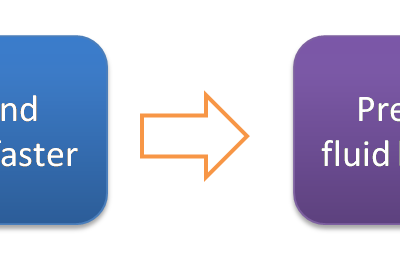
Physics Form 1 Notes : CHAPTER FOUR – PRESSURE
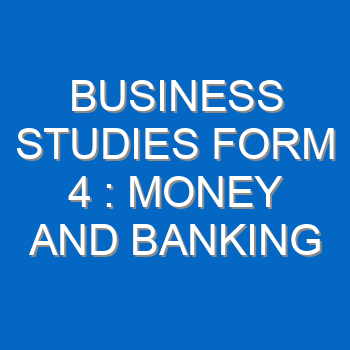
Business Studies Form 4 Notes : MONEY AND BANKING

TRANSPORT AND COMMUNICATION QUESTIONS AND ANSWERS

METAL WORK KCSE PAST PAPERS QUESTIONS AND ANSWERS PDF
Civic Education Lesson Note SS 2 Third Term
Lesson note on civic education ss 2 third term – edudelight.com.
SCHEME OF WORK FOR CIVIC EDUCATION THIRD TERM SS TWO
- Revision of last term’s work
- Responsible Parenthood
Definition of responsible parenthood
Types of responsible parenthood
3 Responsible Parenthood (cont’d)
Roles of responsible parenthood
4 Responsible Parenthood (cont’d)
Importance of responsible parenthood in National development
(a) Responsible Citizenry (b) reduction in crime rates (c) healthy nation (d) informed citizenry (e) self-esteem
5. Traffic Regulations
i. Definition of Traffic Regulations
ii. Types of traffic regulations
6. Traffic Regulations (cont’d)
i. Roles of individual in maintaining traffic regularly
ii Governments role in maintaining traffic regular
iii. Traffic offence
7. Interpersonal Relations
i. Definition of interpersonal relations
ii. Types of interpersonal relations
iii. Essentials of interpersonal relation
iv. Stages of interpersonal relations
8 Interpersonal Relations
- Skills that promote interpersonal relations
- Factors affecting interpersonal relations
9 Inter-communal relationship
- Definition of Inter-communal relationship
- Types of Inter-communal relationships
- Importance of Inter-communal relationships
10 Inter-communal relationship (cont’d)
- Skills necessary for resolving Inter-communal conflicts
11 Revision
12 Examination
RESPONSIBLE PARENTHOOD
Responsible parenthood is the ability and will of parents in raising and nurturing their child from infancy into responsible adult. It is the preparedness on the party of parents to provide for their child basic things that will enable the child to be responsible in meeting his needs and those of the society in general.
Researches from different quarters has shown that the family as the nucleus of the society should nib the buds of society ills and criminal tendencies. This underscores the necessities for responsible parenting.

Responsible parenthood includes, determining the number of children for the family, spacing the children and their education so that they have the best future.
The following should be considered in preparing responsible parenthood.
i. Ability to provide physical, material and psychological needs of the children in the family.
ii. Sound knowledge at child rearing (nurturing)
iii. Ability to adjust emotionally
iv. Sound knowledge of family relationship
Responsible parenthood has to do with issues such as when to marry, when to have children and the family.
In choosing a partner the following should be considered.
- Age: – At least twenty three years for men and twenty for woman
- Personality and character
- Family background
- Economic standing
BASIC CONCEPTS OF RESPONSIBLE PARENTHOOD
It is important to deliberate on the following relevant issues in responsible parenthood:
- Emotional Maturity: – Intending parents should be emotionally prepared to cope with challenges of marriage and life in general. The health of the mother should be considered before the first pregnancy.
- Family size : – The intending parents should decide on the number of children to have in the family with respect to career plans, standard of living ……………to, societal and family resources.
- Child Spacing: – This allows the children to have enough love and affect as well as protect the mother’s health
- Preparedness Benefits: Aspiring parents who takes their time before getting into marriage would have acquired requisite element to rear their children and build a strong home. Such elements include good education, employment, and psychological maturity and so on
- What are the positive effects of responsible parent hood in Nigeria.
- What are the roles of responsible parent hood in national development
Edudelight Lesson Note
Roles of responsible parents (general).
The roles of responsible parents shall be viewed from three different perspectives
- General role: The basic needs of life should be provided for the children by the parents such basic needs includes; food, clothing, and shatter and should be in the right standard house and replacing of all grown children as well as clothes for different clothes seasons.
- Caring: This includes provision of adequate health care from competent hands, addition to feeding, housing and clothing. The parents should not neglect the children at any point in time
- Formal education: Quality education – a legacy for life will shape the child for challenges of adulthood and they will be responsible citizens who are financially independent, useful to the themselves, parents and society, quality educational institution include the nursery ,primary, secondary and tertiary institution ,children have the right to know everything they want to know.
- Provision of informal education: This is a form of socializing the child, by teaching those him things like table manners, courtesy, honesty, integrity, hand-work, patriotism, loyally to the nation and other moral values.
- Emotional care: Providing love, affection, being farming disciplining when they err, watching the kind of people they keep and mentoring them to appreciate hardworking and other moral values help the children to develop good behaviors which is necessary to be responsible in the society
Roles of the responsible father in the family
- He provides the basic need for the family survival
- Protects and defends the family
- He provides money to sustain the family
- He ensures that unity, love and peace pervades the family
- He is far in chastising and disciplining
Roles of a responsible mother in the family
- Demonstrating acceptable behavior to the children through good lifestyle
- Show love and care to members of the family
- Preparing good meals for the family
- Training children on domestic chores by caring for the home, clothes and food preparation
- Supports the father in meeting the family needs
- Report to the father necessary acts of indiscipline for a form approach
- Ensures cleanliness of the home
- Describe responsible parenthood.
- Explain the legal duties of responsible parenthood.
IMPORTANCE OF RESPONSIBLE PARENTHOOD TO NATIONAL DEVELOPMENT
Responsible parenting are affords our national development the following benefits:
- It helps in reducing crime rate: – Good upbringing of children will make them law abiding eschew crimes and violence
- It helps in raising responsible future leaders: – It instills right leadership values in children would be resourceful managers, good politicians and policy makes in future
- It helps in raising good citizens: – It brings good citizen who would be reliable and responsible
- Healthy nation: – It provides dependable citizens for the nation who are ready to work for our progress and development
- It boots good image abroad
- It reduces poverty
ASSIGNMENT:
- Proper upbringing of children in the family, can change socio-political, economic and attitude in Nigerian society. Discuss
TRAFFIC REGULATIONS
Traffic regulations are driving laws put in place by the government to regulate or control the attitude of all road users to achieve an orderly and free flow of traffic. It is a body of rules and regulations made by the government to guide and keep safe the road users. It is very important that government put in place these laws with punitive measures for road users.
The federal military government in cognizance of this established THE FEDERAL ROAD SAFETY COMMISSION (FRSC) in February 1988 through decree US of 1988 to prevent road accidents and loss of lives on public road throughout Nigeria.
TRAFFIC REGULATIONS IN NIGERIA
In Nigeria road users include pedestrians, motorcyclists, private motorist and passengers, drivers of trucks and commercial vehicles.
They are expected to observer some traffic regulations for their safety and other roads users’.
SOME OF SUCH TRAFFIC REGULATION ARE STATED BELOW:
- Motorists should never drink alcohol before and while driving
- Motorcyclist should wear crash helmet and should not caring more than one passenger
- Motorists and motorcyclists should not over speed
- Motorist and motorcyclist should make or receive calls
- They should strictly obey road sign
- Motorists should use seat bell at all things
- Pedestrians should use pedestrian bridges, road pavement or zebra crossing where available
- Pedestrians should look left. Right and left again before crossing
- They (pedestrian) should walk opposite the traffic than backing it when walking
TRAFFIC CONTROL DEVICES
These are electronic or non-electronic materials for controlling the free movement of vehicles and ensure safety use of road by everyone. They include traffic light road signs and boards.
- Traffic lights or lamp-stop lights or signal lights are signaling devices positioned a road intersection, pedestrian across and other locations to control current traffic. Traffic lights were first installation done 1868 they are now in use in most cities and town around the world nowadays. They alternate the right way of road users by displaying rights of standard colors (Red, Yellow/amber and green). The colors are universal code to enable color bling road users to be able to understand. The green light allows the traffic to proceed in devoted, the yellow/amber light implies incoming vehicle should be prepared to stop before the interaction while the red light implies oncoming vehicles should stop or are prohibited from proceeding
- Traffic signals/ Road Sign: – Traffic signs give drivers and other road users in formations and warning depending on the shape, color and placement of the sign. Essentially a road sign must meet four requirements.
- Fulfill a need
- Command attention (bold enough for identification)
- Give adequate time for proper response
CLASSIFICATION OF ROAD SIGNS
Road signs can be classified into;
- Regulatory Signs: – These signs are often circular in shape and can further be divided into two;
- Mandatory regulatory sign: – These signs are usually with blue circle. Examples are diversion signs, round about signs
- Prohibitive regulatory signs: – These are signs with red and yellow circles. Examples include; stop sign and no right turn signs and u -turn signs
- Informative Signs: – These signs give information to road users. They are always rectangular in shape. Examples include; hospitals signs, advanced direction sign school signs and so on.
MINIMAL SPEED NO U-TURN
NO STOPPING U-TURN
NO PARKING BEND
NO LEFT TURN TWO WAY TRAFFIC AHEAD
CROSSING PART ROUND ABOUT
DOUBLE BEND SERIES OF BEND
SLOW DOWN COUNCIL BUS STOP
TURN RIGHT NO HAWKING
MAN AT WORK MOTORCYCLE NOT ALLOW
LEFT TURN
- What are traffic signs?
- Explain traffic regulations.
- Describe four traffic signs with their symbols.
EVALUATION:
- Define road signs and symbols.
ROLE OF INDIVIDUALS IN MAINTAINING A TRAFFIC REGULATIONS
1. Reading high way code frequently: Citizens should acquaint themselves with Nigerian Highway code. It will equip them to all road signs and their meaning
2. Learn to observe road signs: – They should always observe road signs to make the road safe and reduce traffic jam in our cities
3. Constantly ensure that vehicles are road worthy: – vehicles owners should ensure that vehicles are good order and road worthy before putting them to use. All lights on the vehicle must be working perfectly.
4. Assist in controlling traffic when necessary: – Individuals should volunteer to control traffic when the need arises and as well join special marshal of federal road safety crops to be trained in traffic control.
5. Obey traffic warden: – Motorists and motorcyclist must always obey traffic warden to avoid traffic jams and ensure safely on the road.
ROLES OF GOVERNMENT IN MAINTAINING TRAFFIC REGULATIONS
1. Ensuring that traffic lights are erected in strategic location: The government in its economy should sight functioning traffic lights and different junctions and inter-sections
2. Proper construction of roads with relevant roads signs: To avoid accidents, all road signs must be installed conspicuously in appropriate places like sharp corners, valleys, hills, roundabouts and so on
3. Proper functioning of federal road safety commission: Government should give adequate support to the federal road safety commission for their effective functioning
4. Severe punishment of traffic offenders: – People which drink and drive who make calls while driving or do not observe traffic lights and so on should be severely punished.
5. Enactment of Law: – The national assembly should make more laws to further empower traffic managers and management authorities to prosecute those who break traffic laws
6. Stop indiscriminate issuance of driver’s license: – Drivers must go through rigorous training or test by appropriate authorities issuing d drivers license before issuing them drivers license.
7. Regular public enlightenment on traffic regulations and traffic sign : – Educating the masses on traffic regulations and signs through the media should be done by the appropriate authorities like FRSC and vehicle inspection office.
TRAFFIC OFFENCES
- It is an offence to drive a vehicle without valid vehicle license or identification mark being disobeyed.
- It is an offence to disobey traffic light signals
- It is an office to use a road under construction
- It is an office to cover umber plates at the front and rear sides of the vehicle
- It is an offence to smoke or eat while driving
- It is an offence to drive under 18 years of age
- It is an offence to travel in the bed of a picking truck by and person
- It is an offence to drive with one hand
- It is an offence to drive a vehicle with projected load
- It is an offence to fail to move over the slow lane to free up traffic flow
- It is an offence to drive a vehicle that is mechanically deficit
- It is an offence to fail to use head lights during in dement weatherEE
- It is an offence to provide incorrect address under the law
- It is offence to use your GSM phone while driving
- It is an offence to load a vehicle above the weigh or number of passengers required by law
- It is an offence to use safety belts while driving
- It is offence to assault a Marsha on duty
- It is an offence to drive a vehicle without fire extinguisher
- It is an offence to remove firm a vehicle the sign no not move
- It is an offence to drive a vehicle or motorcycle with forged vehicle papers
- Explain traffic offences.
- State two each of individual’s role and government’s role in maintaining traffic regulations.
INTERPERSONAL RELATIONS
Man according to Aristotle is oreganos or social being whose survival and unceasing existence rely on this mutual interaction or relationships with other fellow beings like him.
Therefore to be social is to be a member of a bigger more ideal network of the society concerned with the development of mutual understanding and harmonies relationship.
Assembling the foregoing interpersonal relationship can be the interaction between two or more people in the society in a bid to fulfill one or more needs.
Interpersonal relationship can be opened secret or annoying (chatting on the internet)
Essential of inter-personal relations vital in building interpersonal relations are:
- Sharing of common goals: – Persons interpersonal relationship should have common goals, objectives and interests
- Respect for each other’s view
- Healthy inter-dependence
- Transparency: – There must be honesty, sincerely and trust among them

STAGES OF INTERPERSONAL RELATIONSHIP
George lavender a renowned socio psychologist explained five stages of interpersonal relations which are;
i. Acquaintance stage: – This starts at the point when two people meet at church, social gathering, stadium, and club house
ii. Build up stage: – Elements of growth, trust and confidence appreciate in each other
iii. Continuation stage : – There is a deeper level of trust confidence and closeness. The passion and feeling each other enlarges
iv. Decelerations: – The love, trust and passion for each other begins to ware
v. Terminating stage: – Relationship can come to an end clue to the death of partner, devoice and separation
TYPES OF INTERPERSONAL RELATION
i. Relationship between man and a woman: – This is usually between unmarried men and woman and Often leads to marriage especially when formalin
ii. Relationship between man and man: – This type of relationship is between to people attracted each equally as the share common interest, religion, sport profession and so on
iii. Relationship between woman and woman
- What is inter – personal relationship ?
- Enumerate two stages of inter – personal relationships.
INTER-COMMUNAL RELATIONSHIP
Inter-communal relationship is a relationship that occurs between two or more commodity. The outbreak of communal conflicts and insurgencies makes it necessary to put certain measures in place. To address a social problem, It is natural for individual differences to manifest while we interact one with another and then it will be colossal when mechanisms are not in place to prevent such situations. Peaceful and healthy inter-communal relationship is therefore necessary in sustaining her society.
IMPORTANCE OF INTER-COMMUNAL RELATIONSHIP
A positive communal relationship is important in the following ways: –
- It will enhance productivity and eventually promote total development of a community.
- Promotes co-operation and inter-tribal marriages: – This is shown among different communities giving their children’s hand in marriage.
- It enhances government programs and he success of policies when there are no communal conflict: – Government programs and policies can be implemented. The overall effect of this is the improvement in the welfare of the people.
- It enhances economic progress good inter communal relationship will create an atmosphere for trade and business in the entire country. Also foreign investor would like to invest in a peaceful region in the country. This in turn will increase the level of economic and industrial activities in the country.
- It allows for cross fertilization of culture and ideas: – This can further boost completion
- Explain inter-communal relationship.
- State three importance of inter – communal relationship.
INTER-COMMUNAL RELATIONS
Skills for resolving inter-communal conflicts .
- Accommodation/tolerance
- Adequate communication: means a stich in time saves nine
- Compromise: Means no victor no vanquished, leaving some of your interest for peace to reign
- Compensation: When conflicts come up there is bound to be damages of properties and loss of lives by compensation we mean the part that actually inflicted most injury on the weaker side make reparations
- Dialogue: When two communities at war are seeking for peace and harmony, they can come together in a conference to discuss solutions to the conflicts and put some compromise in place
- Special peace keeping task force: In order to achieve a truce. The government set up special peace keeping task forces which are composed of the military that is the air force, navy, army, and police to prevent further destruction of lives and properties before conference is made.
WAYS OF PROMOTING INTER-COMMUNAL RELATIONSHIP
- Proper utilization of resources
- Polities without tribalism: Political leaders should not use their good offices to cause conflict between two communities as a result of their tribalistic tendencies
- Protection of human rights.
- Describe three skills necessary for resolving inter – communal conflicts.
- Explain inter – communal relationships.
Economics Lesson Note for SS1 Second Term
First term science reception scheme of work, valuing nigerian goods, lesson notes on christian religious studies (crs) ss1 second term.

SECOND TERM SCHEME OF…
Lesson note on agricultural….

Lesson Note on English…
Leave a reply cancel reply.
Your email address will not be published. Required fields are marked *
Privacy Overview
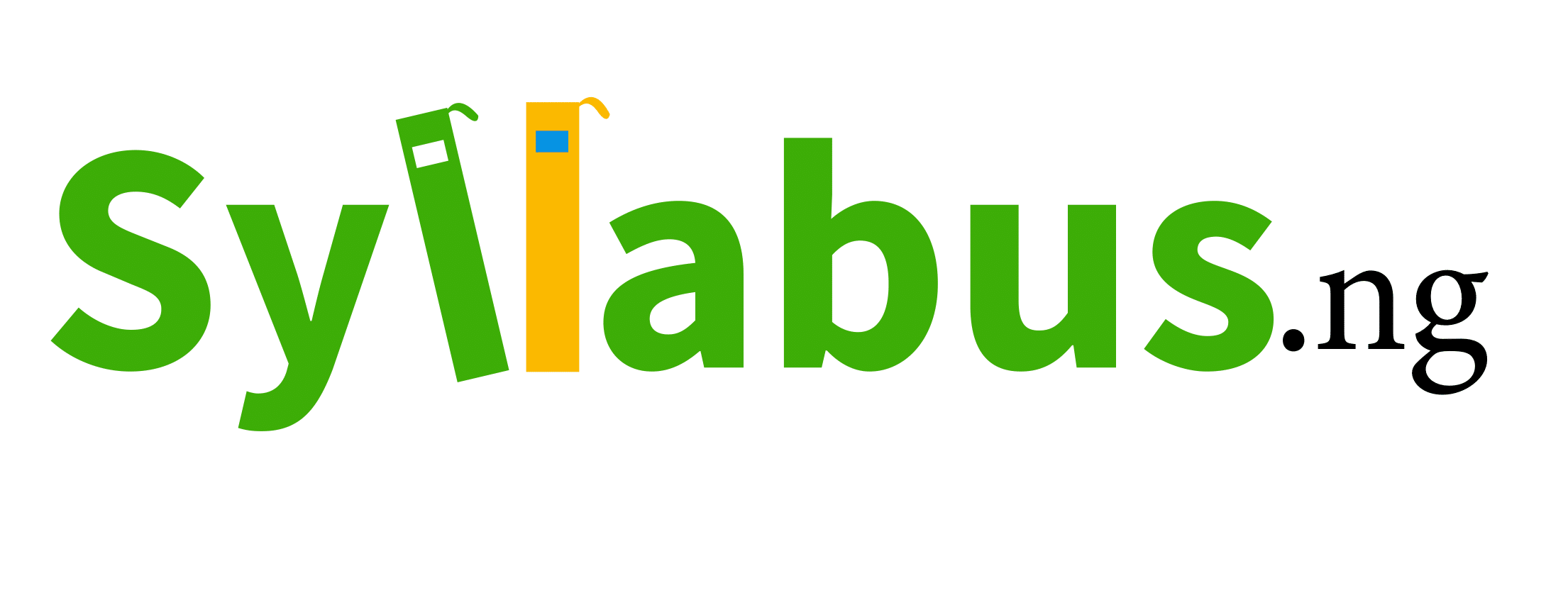
SS2 Civic Education Scheme of Work
Download the Senior Secondary School 2 (SS2) Unified Scheme of Work for Civic Education to serve as a guide for educators

Home » SSS2 Scheme of Work » SSS2 Civic Education Scheme of Work
About ss2 civic education scheme of work.
Civic education is essential for developing well-informed, responsible, and active citizens. It addresses Nigeria’s distinct socio-political environment, providing students with the knowledge and skills needed to participate in their communities and society effectively.
The Lagos State unified scheme of work for Senior Secondary 2 (SS2) Civic Education offers a comprehensive foundation for understanding the principles and practices of civic life. This scheme of work covers critical areas such as government structure and functions, the rule of law, human rights, national identity, and citizen responsibilities. It seeks to instill a profound appreciation for democratic values and principles, highlighting the importance of active involvement in governance and community development. By delving into topics like the Nigerian Constitution, electoral processes, and the roles of various government branches, students develop a solid grasp of their country’s operations and their role within it.
The Lagos State unified scheme of work provides a thorough educational framework that prepares students to become proactive and conscientious citizens. By studying Civic Education at this level using the unified scheme, they are equipped to make positive contributions to the democratic process and the sustainable development of Nigeria.
Achievement Standards
At the end of the SSS2 session, students can;
- Explain the meaning and importance of citizenship education;
- Discuss skills required for promotion of our tradition and customs beliefs;
- Justify factors that prevent the promotion of national consciousness;
- Differentiate between capitalist democracy and political party;
- Identify reasons for a political party and describe re-calls;
- Analyse activities of poverty alleviation programme;
- Define human rights and identify what may limit human rights;
- Describe drug abuse causes and identify ways of preventing drug abuse and list activities of drug enforcement agencies;
- State the roles of individuals and government in maintaining traffic regulations;
- Identify government officials responsible for maintaining traffic regulations e.g. FRSC.
- Outline skills for resolving inter-communal conflicts/challenges of inter-communal conflicts;
- Demonstrate the stages of interpersonal relationships.
Assessment Guide
In senior secondary school 2, students are assessed in Civic Education based on the school’s prerogative. However, typically, they are evaluated through tests or quizzes (Continuous Assessment Tests) and end-of-term exams.
Grading follows a scale from A to F, with A representing excellent performance, typically scoring around 70% or 80%, and F indicating failure, usually below 50% or 45%.
Download SSS2 Civic Education Scheme of Work

Know what’s expected of you as an educator
Download the Lagos State Unified Scheme of Work for Senior Secondary School Two (SSS2) Civic Education
SS2 First Term Scheme of Work for Civic Education
| LAGOS STATE MINISTRY OF EDUCATION UNIFIED SCHEMES OF WORK FOR SENIOR SECONDARY SCHOOLS | ||
| Civic Education Scheme of Work for Senior Secondary Schools 2(SSS2) | ||
| CLASS | SS2 | |
| SUBJECT | CIVIC EDUCATION | |
| TERM | First Term | |
| WEEK | TOPICS | Learning Objectives |
| 1 | CITIZENSHIP EDUCATION – Introduction to citizenship education – Importance of citizenship education | By the end of the lesson, students should be able to: i. explain the meaning of citizenship education ii. mention and demonstrate the duties of citizenship education to the community iii. analyze the importance of citizenship education |
| 2 | DUTIES AND OBLIGATIONS OF CITIZENS – Definition of duties and obligations – Duties and obligations of citizens to their communities eg security, obedience to rules and regulations | By the end of the lesson, students should be able to: i. mention the duties and obligations of a citizen ii. discuss their duties and obligations to their communities |
| 3 | SKILLS NECESSARY FOR THE PRESERVATION OF OUR TRADITIONS, BELIEF AND CUSTOMS IN NIGERIA | By the end of the lesson, students should be able to: i. discuss the skills required for the promotion of our tradition, customs, belief, etc ii. demonstrate a play on preservation of tradition and custom |
| 4 | NATIONAL CONSCIOUSNESS – Meaning of national consciousness , national integrity, national unity – How to promote national integrity, unity and consciousness – Factors that prevent the promotion of national consciousness | By the end of the lesson, students should be able to: i. explain the concept of national consciousness, integrity and unity ii. highlight ways to promote national consciousness, integrity and unity iii. discuss and justify factors that prevent the promotion of national consciousness (group project) |
| 5 | CAPITALIST DEMOCRACY – Definition of capitalist democracy – Characteristics of capitalist democracy – Political parties: definition and characteristics | By the end of the lesson, students should be able to: i. explain capitalist democracy and it’s characteristics ii. analyze political parties and it’s characteristics |
| 6 | HOW POLITICAL PARTIES COMPETE FOR POWER THROUGH ELECTIONS – Functions of political parties | By the end of the lesson, students should be able to: i. describe how political parties compete for power through elections ii. analyze the functions of political parties |
| 7 | MID-TERM BREAK | |
| 8 | POVERTY AND IT’S EFFECTS – Importance of employment in alleviating poverty – Programs of poverty alleviation eg NEEDS, NAPEPS,etc | By the end of the lesson, students should be able to: i. explain how employment can alleviate poverty ii. describe what prompts and guarantees employment eg free education, medical care, etc iii. analyze activities of poverty alleviation programs |
| 9 | POLITICAL APATHY – Learning of political apathy – The various forms of political apathy eg refusal to register to vote, refusal to vote or protest against rigging of elections – How to stop political apathy – Meaning of recalls | By the end of the lesson, students should be able to: i. explain political apathy ii. analyze it’s various forms iii. identify reasons for political apathy iv. describe re-calls and give recent example |
| 10 | REASONS WHY LEADERS FAIL TO PROTECT THE INTEREST OF THEIR FOLLOWERS – Ways to control leaders that fail to protect the interest of their followers in their communities | By the end of the lesson, students should be able to: i. explain why leaders fail to protect the interest of their followers ii. discuss how to control leaders that fail to protect followers in their communities |
| 11 | REVISION | |
| 12 | EXAMINATION | |
SS2 Second Term Scheme of Work for Civic Education
| CLASS | SS2 | |
| SUBJECT | CIVIC EDUCATION | |
| TERM | SECOND TERM | |
| WEEKS | TOPICS | LEARNING OBJECTIVES |
| 1 | POPULAR PARTICIPATION – Definition of popular participation – Factors that promote popular participation – Reasons why people do not participate in politics eg ignorance, economics, discrimination | By the end of the lesson, students should be able to: i. explain popular participation ii. outline the factors that promote popular participation iii. identify reasons why people do not participate in politics |
| 2 | HOW POPULAR ORGANIZATIONS ARE FORMED – Roles of popular organizations in development | By the end of the lesson, students should be able to: i. describe how popular organizations are formed ii. highlight activities of some popular organizations |
| 3 | HUMAN RIGHTS – Meaning of human rights – History of human rights and 1948 declaration of human rights – Limitations of human rights eg war, emergency, politics | By the end of the lesson, students should be able to: i. explain human rights ii. discuss human rights declaration of 1948 iii. identify what may limit human rights |
| 4 | EMERGENCY – Meaning – What happens during emergency – Ways of reducing emergency | By the end of the lesson, students should be able to: i. discuss state of emergency ii. explain what happens before state of emergency can be declared and how the process is carried out iii. highlight the ways by which state of emergency can be reduced |
| 5 | DRUG USE AND DRUG ABUSE – Meaning of drug abuse – Types of drugs and how they can be abused – Causes of drug abuse | By the end of the lesson, students should be able to: i. explain the meaning of drug abuse ii. identify drugs,their use and how they can be abused iii. describe the causes of drug abuse |
| 6 | HOW DRUG ABUSE DEVELOPS – Signs and symptoms of drug abuse eg depression, violence | By the end of the lesson, students should be able to: i. identify ways drug abuse habits can develop ii. highlight and discuss the signs and symptoms associated with drug abuse |
| 7 | MID-TERM BREAK | |
| 8 | EFFECTS OF DRUG ABUSE – Behavior of drug addicts – Agencies against drug abuse eg NDLEA, NAFDAC | By the end of the lesson, students should be able to: i. discuss some of the behaviors that are peculiar to drug addicts and how to recognize them ii. highlight some of the agencies that fight drug abuse and how they carry out their duties |
| 9 | WAYS OF PREVENTING DRUG ABUSE – Different types of drugs – Drug laws: Laws promulgated against drug abuse | By the end of the lesson, students should be able to: i. identify and categorize the kinds of drugs we have ii. discuss the various laws or edicts against drug abuse iii. justify the reasons behind each of the laws against drug abuse |
| 10 | ACTIVITIES OF DRUG ENFORCEMENT AGENCIES – Activities of NAFDAC | By the end of the lesson, students should be able to: i. Explain the activities of agencies against drug abuse eg NDLEA, NAFDAC |
| 11 | REVISION | |
| 12 | EXAMINATION | |
SS2 Third Term Scheme of Work for Civic Education
| CLASS | SS2 | |
| SUBJECT | CIVIC EDUCATION | |
| TERM | THIRD TERM | |
| WEEKS | TOPICS | LEARNING OBJECTIVES |
| 1 | RESPONSIBLE PARENTHOOD – Meaning of responsible parenthood and types – Patterns of responsible parenthood – Roles of responsible parenthood eg security, education | By the end of the lesson, students should be able to: i. explain the meaning of responsible parenthood ii. demonstrate in groups,the pattern of responsible parenthood iii. identify and discuss the roles of responsible parenthood |
| 2 | FACTORS THAT LEAD TO THE SUCCESS OF RESPONSIBLE PARENTHOOD – Importance of responsible parents to the society – Constraints of good parenthood – Effects of parents lacking in their responsibility | By the end of the lesson, students should be able to: i. analyze the importance of responsible parenthood in the national development ii. discuss the constraints of good parenthood in modern society iii. examine the effects of parents lacking in their responsibilities |
| 3 | TRAFFIC REGULATIONS – Definition of concepts and traffic lights – Traffic regulations eg obeying traffic officials and signs | By the end of the lesson, students should be able to: i. define and explain the meaning of traffic regulations ii. identify some traffic regulations and signs iii. analyze the roles of individuals and government in maintaining traffic regulations |
| 4 | DUTIES OF PEDESTRIANS – Causes of road accidents – The role of drivers in reducing road accidents | By the end of the lesson, students should be able to: i. analyze the role of individuals in maintaining traffic regulations ii. discuss in groups the role of drivers in reducing accidents |
| 5 | WAYS OF REDUCING ROAD ACCIDENTS – Functions of Federal Road Safety Corps (FRSC), LASTMA – Roles of traffic wardens – Roles of individuals in maintaining traffic regulations – Maintaining traffic regulations | By the end of the lesson, students should be able to: i. identify the government officials responsible for maintaining traffic regulations eg FRSC, LASTMA ii. analyze the roles of traffic wardens iii. demonstrate how to maintain traffic regulations |
| 6 | INTERPERSONAL RELATIONS – Meaning of interpersonal relationships and types – Characteristics of interpersonal relationships | By the end of the lesson, students should be able to: i. explain interpersonal relationships ii. demonstrate the meaning of interpersonal relationships iii. identify the characteristics of interpersonal relationships |
| 7 | MID TERM BREAK | |
| 8 | INTERPERSONAL RELATIONSHIP – Stages of interpersonal relationship eg men/women, government and individual relationship | By the end of the lesson, students should be able to: i. identify the stages of interpersonal relationships ii. demonstrate the stages of interpersonal relationships iii. analyze the types of friendship |
| 9 | IMPORTANCE OF INTERPERSONAL RELATIONSHIP – Intercommunal relationship (meaning and importance) – Skills that promote interpersonal relationships eg honesty, tolerance | By the end of the lesson, students should be able to: i. state the importance of intercommunal relationship ii. identify and explain the skills for resolving intercommunal relationships |
| 10 | CHALLENGES OF INTERCOMMUNAL CONFLICTS – Problems of boundary disputes in Nigeria | By the end of the lesson, students should be able to: i. outline some of the challenges of intercommunal conflicts ii. identify communities whose disputes are yet to be resolved |
| 11 | SKILLS FOR INTERCOMMUNAL CONFLICTS – eg dialogue , mediation | By the end of the lesson, students should be able to: i. analyze the skills for resolving intercommunal conflicts ii. explain the skills for conflict resolution |
| 12 | REVISION/EXAMINATION | |

Recommended Civic Education Textbooks for Senior Secondary School 2
The recommended Civic Education textbooks for SSS2 include but are not limited to the following:
- Model Civic Education for Senior Secondary school with workbook by Anene Anthony. Mid-Field Publishers Ltd SS 1 -3
- Pacific Civic Education for Upper UBE Class by Victor Emeka Okafor, Francis O Arinze. Pacific Publishers Ltd SS 1-3
- WABP Civic Education by Dayo Olagunju. West African Book Publishers SS 1-3
- Varsity Model Civic Education for Secondary School and Colleges by Babalola G.M, Ogbalu et al. Varsity Publishing company SS 1-3
- Religion and National Values by Olisa A.C. New Age Press Ltd SS 1-3
- Model Basic Civic Education by Obi, Franca Ego, Ph.D, et al. CHASE PUBLICATIONS LIMITED
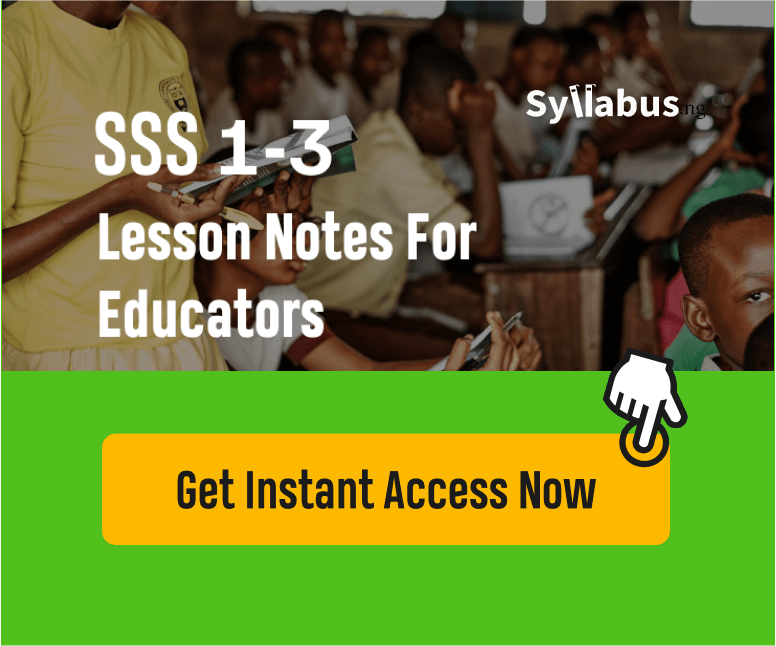
SSS2 Scheme of Work for All Subjects
Core subjects, science, math & technology subjects, business subjects, trade subjects, other categories.
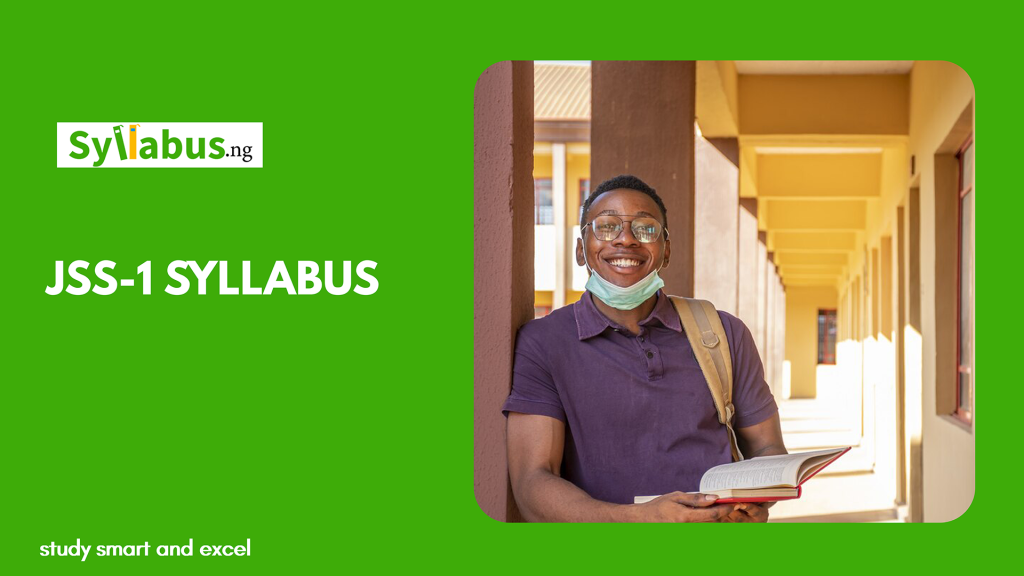
JSS1 Scheme of Work
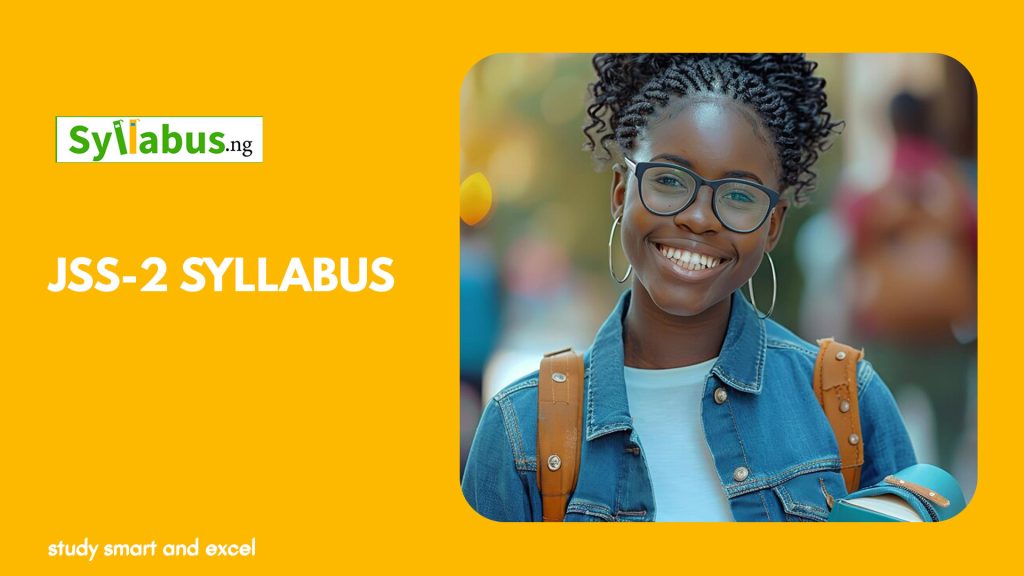
JSS2 Scheme of Work
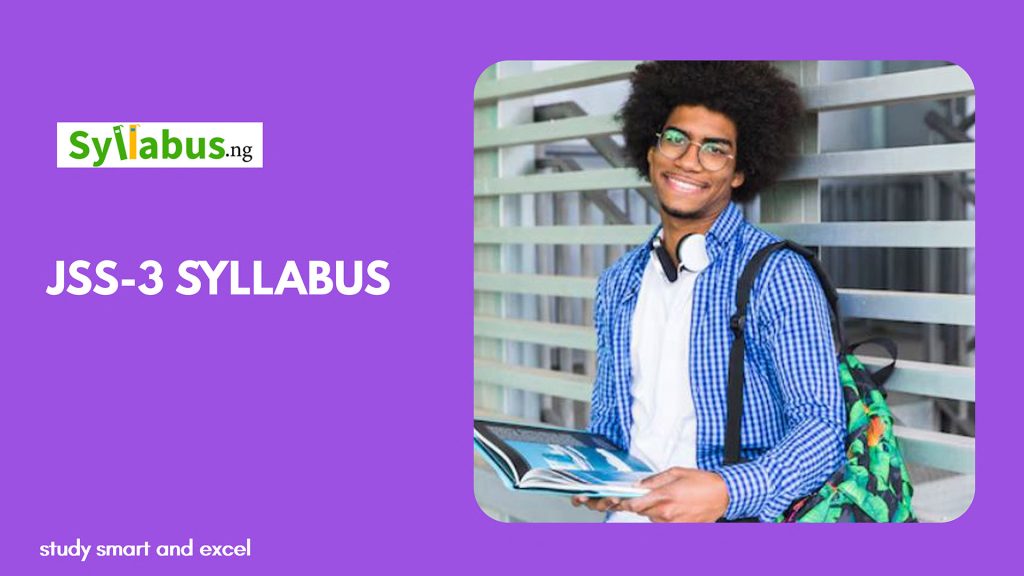
JSS3 Scheme of Work
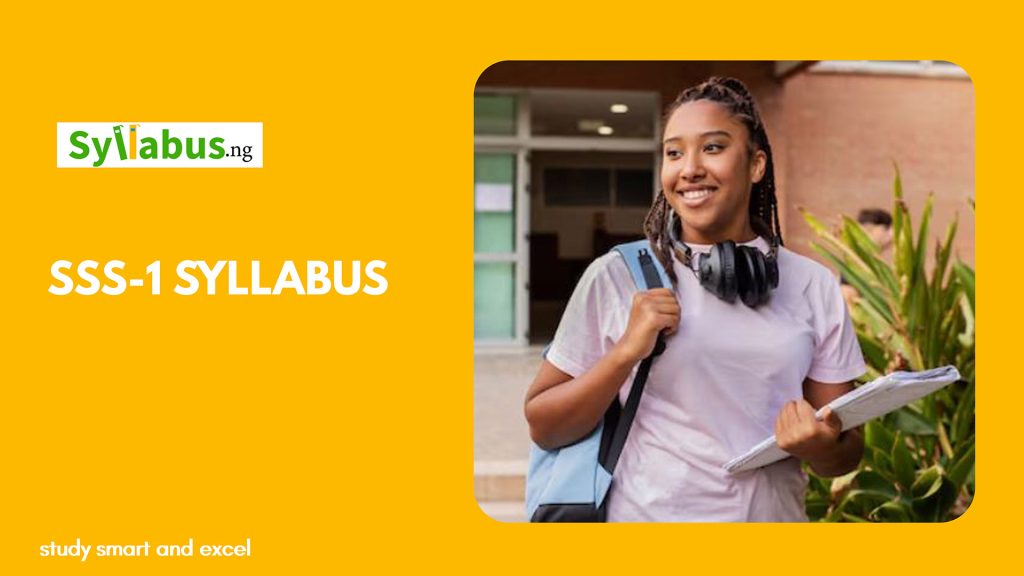
SS1 Scheme of Work

SS2 Scheme of Work
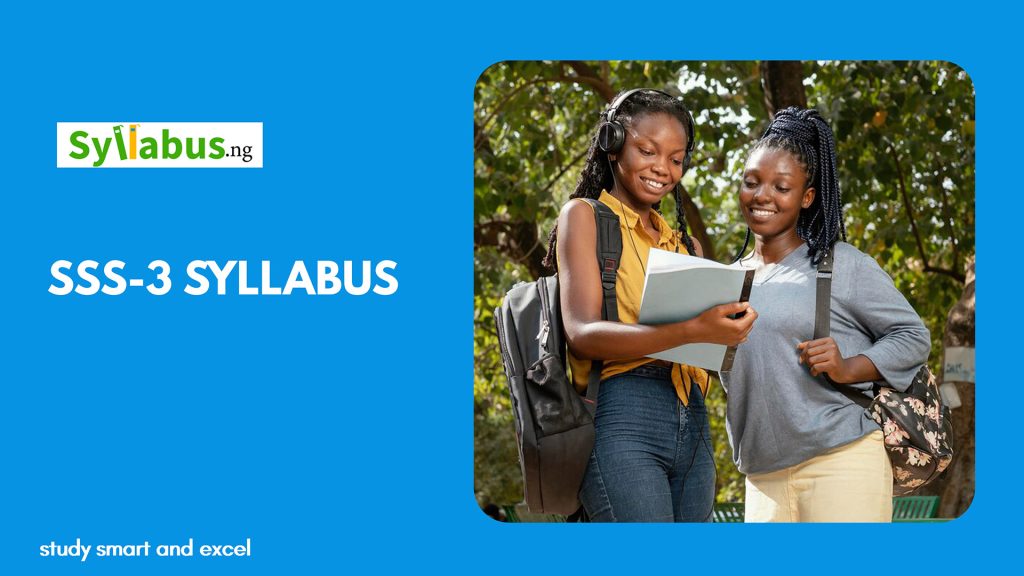
SS3 Scheme of Work

BECE Syllabus
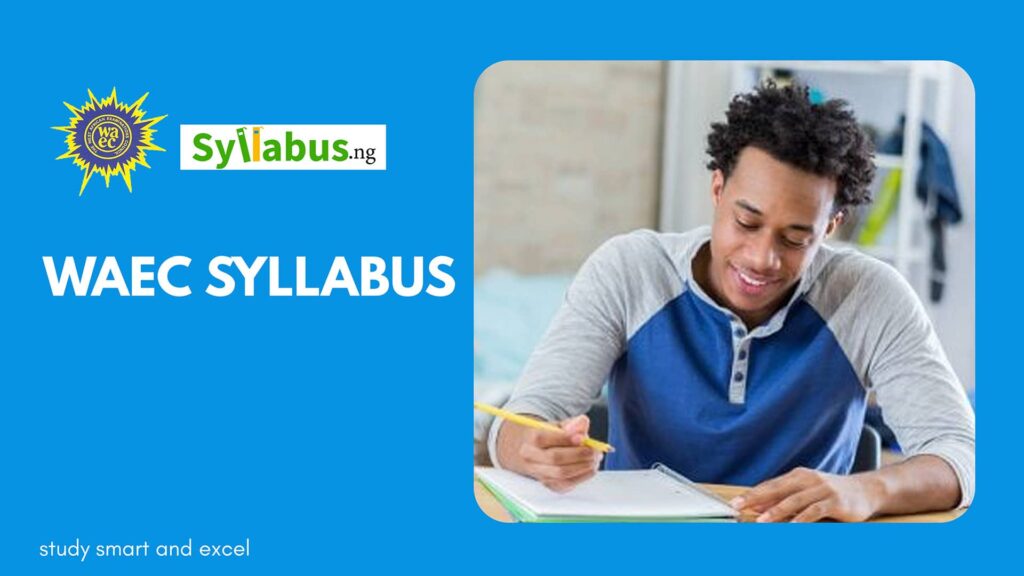
WAEC Syllabus
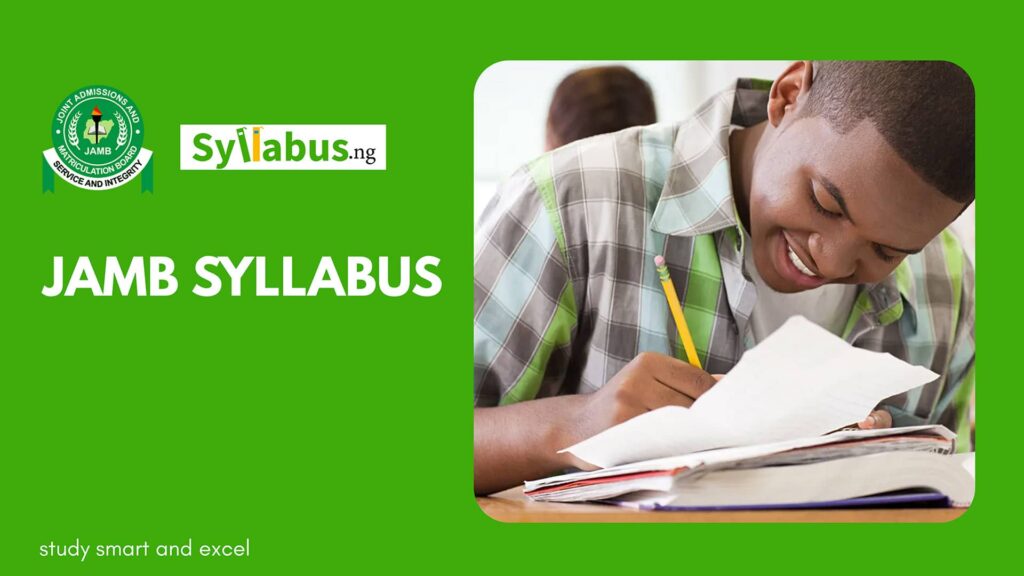
JAMB Syllabus
Exam syllabus, neco syllabus, jupeb syllabus, nabteb syllabus, professional certification, ican syllabus, citn syllabus, trcn syllabus, cipm syllabus, scheme of work, sss1 scheme of work, sss2 scheme of work, sss3 scheme of work, advertise with us, privacy policy, terms & condition.


IMAGES
VIDEO